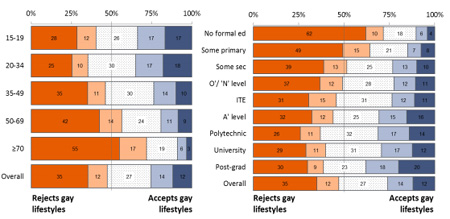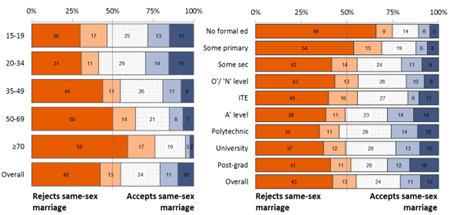In the latest survey commissioned by the government, some 26% of 4,000 Singaporeans polled said they were accepting of “gay lifestyles” while 27% were neutral and 47% disagreed with the statement. The results further showed that more educated and younger Singaporeans were comparatively more accepting.
The issue of same-sex marriage garnered less support with 21% being supportive, 24% neutral and 55% disagreeing. The two questions were asked as part of the Our Singapore Conversation Survey, a government-led project to "get a snapshot of Singaporeans’ priorities, values and preferences".

Figure 14: Preference between rejecting vs accepting gay lifestyles.
Survey question: "I would prefer that society rejects gay lifestyles" vs
"I would prefer that society accepts gay lifestyles"

Figure 15: Preference between rejecting vs accepting same-sex marriage.
Survey question: "I would prefer that society rejects same-sex marriages" vs
"I would prefer that society accepts same-sex marriages"
While the figures don’t come as a surprise, members of Singapore’s LGBT community called into question the use of the “gay lifestyles” used in the survey.
Media commentator Kirsten Han who was clearly outraged by the use of the term wrote on her blog: “What, exactly, is the 'gay lifestyle'? Do we honestly believe such a thing exists? The idea of the ‘gay lifestyle’ is nothing but a huge, steaming plate of bullshit served up by people who have made little-to-no effort to understand those different from them. And we need to get rid of this rubbish NOW.” She added: "When we stop thinking of it as a ‘gay lifestyle’ and start seeing it for what it is — i.e. people who are being judged and discriminated against based on who they love — then we have a better shot at relating to one another, understanding one another and accepting one another."
Nei, who wrote a column for Sayoni, a queer women’s advocacy group, said: “'Gay lifestyle' implies choice and ease of change. No matter how important a role nature or nurture play in being gay, it's not something we just stop being. Being queer is an important part of who we are and is closely tied to crucial, positive human feelings such as love and affection as well as sex. Referring to it as a lifestyle implicitly rejects queer people, and if the survey said this, I’d like to know where the researchers were coming from in asking the question.”
When Fridae contacted Senior Research Fellow Leong Chan Hoong – one of the survey's researchers from the Institute of Policy Studies (IPS) – and explained the controversial phrase, he conceded that on hindsight, the survey could have used a more "nuanced and calibrated" term.
He clarified that the survey did not eleborate on the contentious term and explained that the questions throughout the survey were designed to allow respondents to interpret the question "using a lens they are normally used to."
Dr Leong further highlighted that the “landscape (with regard to gay acceptance) is evolving” and that just over one in two Singaporeans polled are accepting or at least indifferent to the issue.
The US-based gay media watchdog GLAAD advises journalists to avoid using lifestyle" or "homosexual lifestyle" as it could be offensive. “There is no single lesbian, gay or bisexual lifestyle. Lesbians, gay men and bisexuals are diverse in the ways they lead their lives. The phrase "gay lifestyle" is used to denigrate lesbians and gay men, suggesting that their orientation is a choice and therefore can and should be "cured".
Pink Dot Singapore, a movement that supports LGBT acceptance, says it rejects the use of the term “gay lifestyle” in the media and in academic research.
“A person’s sexual identity cannot be described as merely a lifestyle because it reduces him or her down to one shallow facet of their identity. The term also does not allow for the diversity that exists between lesbian, gay and bisexual individuals nor the similarities between LGBT and straight communities. There is no such thing as a ‘gay lifestyle’ because there is no one sameness that permeates through all LGBT people in Singapore or across the world,” Pink Dot said in a statement to Fridae. It added, “When used in research, it creates a bias because it predetermines for unfamiliar interviewees that sexuality is a choice rather than an innate characteristic.”
The survey was conducted by the Institute of Policy Studies (IPS) as part of the Our Singapore Conversation, a government-led initiative, from December 2012 to January 2013. According to IPS – a think-tank within the Lee Kuan Yew School of Public Policy at the National University of Singapore – the sample is demographically representative of the national population in terms of age, gender and ethnicity.
